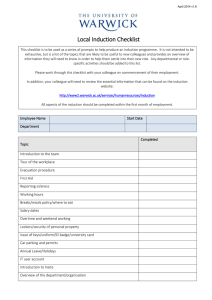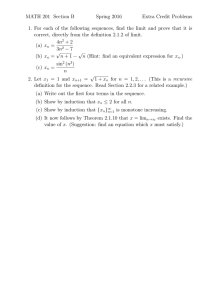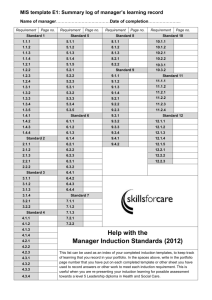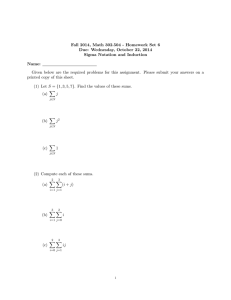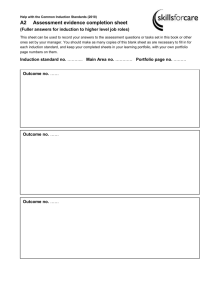Corporate induction policy - South Central Ambulance Service
advertisement
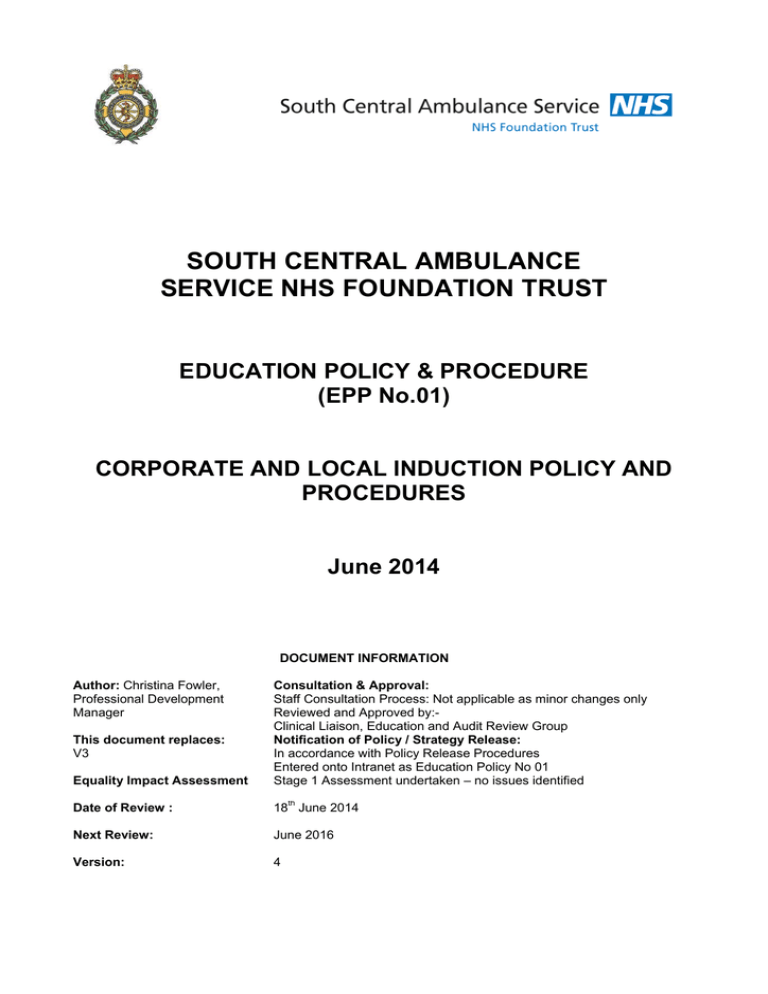
SOUTH CENTRAL AMBULANCE SERVICE NHS FOUNDATION TRUST EDUCATION POLICY & PROCEDURE (EPP No.01) CORPORATE AND LOCAL INDUCTION POLICY AND PROCEDURES June 2014 DOCUMENT INFORMATION Author: Christina Fowler, Professional Development Manager Equality Impact Assessment Consultation & Approval: Staff Consultation Process: Not applicable as minor changes only Reviewed and Approved by:Clinical Liaison, Education and Audit Review Group Notification of Policy / Strategy Release: In accordance with Policy Release Procedures Entered onto Intranet as Education Policy No 01 Stage 1 Assessment undertaken – no issues identified Date of Review : 18th June 2014 Next Review: June 2016 Version: 4 This document replaces: V3 CONTENTS Page 1.0 INTRODUCTION 1.1 1.2 1.3 1.4 1.4a 2.0 3.0 Rationale Scope Principles Temporary and Bank Staff Volunteer staff CORPORATE AND LOCAL INDUCTION POLICY 2.1 5 Policy Statement IMPLEMENTATION AND COMPLIANCE 3.1 3.2 3.3 3.4 3.5 3 5 Duties of the Organisation Objectives of the Programme Internal Relationships External Relationships Compliance and Responsibilities 4.0 EQUALITY STATEMENT 8 5.0 REFERENCES 8 6.0 MONITORING 9 APPENDIX Appendix 1 Corporate Programme 10 Appendix 2 Local Induction Checklist 11 Appendix 3 Template for Local Induction Checklist for temporary staff 16 Appendix 4 Template for Local Induction Checklist for Volunteer staff Equality Impact Assessment 23 2 1.0 INTRODUCTION 1.1 Rationale South Central Ambulance Service NHS Foundation Trust (SCAS) acknowledges the importance of providing a sound, balanced and complete induction programme for all new employees of the Service in a consistent manner. The organisation believes that in order for all new staff to quickly feel that they are part of the Trust a comprehensive Corporate and Local Induction programme delivered very early in their employment is essential. The expectation of the programme is that new members of staff will recognise not only the quality standards and regulations the Trust works to but also the level of care and support it affords its employees. A proper period of induction is essential if the Trust is to ensure that all staff are able to work in a safe manner. The programme will include training appropriate to the individual roles undertaken to ensure that staff are able to work safely and effectively, taking account of risk and health and safety issues and good practice. 1.2 Scope A sound induction is good employment practice. It is essential that staff feel welcomed, valued, and effectively integrated into the team. The programme enables new starters to understand how they contribute to the work of the organisation and the aims, objectives and values of the Trust The Trust is committed to providing a properly resourced, high quality Corporate and Local Induction programme for ALL new staff and volunteers*. The programme includes relevant statutory and mandatory training, such as patient moving and handling training, infection control, and risk management when appropriate. Induction arrangements and training will regularly be reviewed to ensure relevance and that quality is maintained. 1.3 Principles Induction is the process by which staff are familiarised with the Trust. It includes the Corporate Induction course which is facilitated by the Education Department (and key Trust staff who supplement the programme in specialist subject areas), and a Local Induction programme, which is a series of events and phased introduction to the individual job organised by the Line Manager / Supervisor. The Local Induction programme may include specialist training specific to a particular job, and may include a period of mentorship. Mentors** are individual members of staff working at a similar level/role in the organisation to the new member of staff, or if the new member of staff is a specialist or in very senior post, members of staff from other organisations in the local health economy may be requested to provide support during the induction period. The role of the mentor is to provide peer support, and to help new starters understand the complexities of the organisation. Their role is of a more informal manner than the line manager or supervisor, and should help new members of staff to become familiar with the organisation quickly. **See Clinical Supervision Policies for reference to Clinical Mentors The induction period for new members of staff follows a set pattern and is dependant on the individual job role. The period of Corporate Induction, as noted in the programme stated at Appendix 1, is supplemented by a period of Local Induction, this is dependant on the role 3 the new starter will undertake, the programme/check list for Local Induction is stated as Appendix 2. All paperwork and staff information recording procedures (Electronic Staff Records - ESR) should be followed according to Trust procedures. This is required evidence for Healthcare Standards New staff are defined as people who have never previously worked for the Trust, or have recommenced working for the Trust following a break in service in excess of one year, for example, staff on a career break, secondment or extended period of maternity leave, in addition this also applies to people who have worked for the Trust previously, but not within the previous year. There are no exceptions from attendance to induction courses; it is mandatory for all staff and volunteers* regardless of role or status. Staff who change departments will be required to undertake local induction specific to their new department/job role. All new members of staff are expected to comply with this policy and ensure that they attend and complete the induction programme in its entirety. Managers should ensure that staff are allocated adequate time out from their roles to take part in activities that form part of the induction process, this includes the Corporate Induction, Local Induction and any specific professional induction required. It is important that members of staff do not undertake any tasks or operate any medical devices, equipment or machinery for which they have not been adequately trained or familiarised with in SCAS. If any member of staff is in doubt as to their competence or training they should discuss individual situations with their Line Manager / Supervisor. Non-attendance at induction will result in individual members of staff not receiving training that is required by regulation and law. This will put patients, other staff, the individual themselves and the Trust at risk. The Trust takes induction very seriously; anyone not attending the courses in their entirety must be reported to the local H.R. Manager and the Assistant Director of Learning and Development (ADLD) immediately. 1.4 Temporary and Bank Staff ALL temporary staff are required to undertake a period of local induction appropriate to the role they will undertake and the duration of their employment, which should follow the programme/check list for temporary local induction is stated as Appendix 3. This programme must be completed before any work is commenced. Each department manager must ensure that temporary staff in their department receive a localised induction relevant to their duties and work area. All Trust “Bank” staff, new to the Trust, are required to complete the Corporate Trust Induction course prior to being available for work, on occasion this may take place in the normal work place, as opposed to the Education Department, when new staff are unable to attend pre-planned courses, this will be arranged individually with the line manager. Records of induction for temporary staff are the same as for permanent staff and should be kept locally by department managers, e.g. all paperwork and staff information recording procedures (ESR/LMS) should be followed according to Trust procedures. * Temporary refers to everyone working for the Trust for three months or less and who are not paid via ESR 1.4a For all other staff not included above, e.g. volunteers, a Local Induction programme must be completed which reflects the scope of their role. Local managers MUST ensure that all 4 temporary staff and volunteers working in their department should not operate machinery or undertake tasks for which they are not competent or trained. All volunteer staff must complete the Local Induction Checklist appropriate to the role they are undertaking to the minimum required standard within the given timescale. All information relating to this document must be recorded in a timely manner and in accordance with the instruction noted on the document. Records of volunteers will be kept by the volunteer coordinator and forwarded to the local HR Manager as requested Compliance requirements Managers are required to ensure all volunteers complete this process; volunteer details will be recorded on LMS in order to give accurate reports on compliance. Volunteers who fail to complete the local induction are unable to undertake duties on behalf of the Trust. * This refers to the volunteer Community Responders and volunteer car drivers etc 2.0 CORPORATE AND LOCAL INDUCTION POLICY 2.1 Policy Statement The Trust will use all appropriate and necessary means to ensure that it is, and remains, compliant with current healthcare standards in relation to Corporate and Local Induction, providing the direction for best practice and direction to support staff The Trust expects that every new member of staff will follow the designated induction programme for their specific job role in its entirety The Trust expects all Directors, Managers, Supervisors and Facilitators to fully support this programme, and will take non compliance of this programme very seriously 3.0 IMPLEMENTATION AND COMPLIANCE 3.1 Duties within the Organisation The Director of Human Resources has overall responsibility for the implementation of the Corporate and Local Induction programme. The ADLD has responsibility for ensuring the practical implementation of the programme The Education Department facilitates all Corporate Induction for permanent staff. Clinical Induction is facilitated by local Education Centres. Local Induction (as indicated in this document) is facilitated by the relevant line manager/team leader/clinical mentor or supervisor. Approval and monitoring of the effectiveness of the Corporate and Local Induction Programme is undertaken by the Quality and Safety Committee The Clinical Review Group is responsible for the review of the content of the programmes on a regular basis, or when significant revisions are made or required, ensuring that all relevant standards are maintained. The Clinical Review Group will submit documents to the Quality and Safety Committee for approval. 5 Amendment of the programme is the responsibility of the Clinical Liaison, Education and Audit Review group (CLEAR). The Clinical Review Group will review any amendments recommended by the Senior Education Team Meeting. The CLEAR Group will regularly review the objectives, content and methods of delivery of this programme and make recommendations to the Clinical Review Group when amendments are required, using Appendix 4 as a pro forma for review and amendment. The CLEAR Group will monitor induction compliance quarterly via the reporting systems in LMS taking action as appropriate. The CLEAR Group will liaise closely with the Human Resources Team and relevant management teams to ensure that all associated processes are fit for purpose, recommendations for review or alteration will be made to the Clinical Review Group or appropriate HR meeting groups for acceptance prior to submission to the Quality and Safety Committee for approval Flow Chart for Policy Approval, Review and Amendment Quality and Safety Committee Approves and monitor the policy Clinical Review Group Reviews content of programme and submits revisions to the Corporate Quality and Safety Committee Clinical and Education Review Group Amends programme, reviews content and submits to Clinical Review Group for review The Trust acknowledges that when staff are employed on a temporary or very short term basis or for only a very few hours per month it is not appropriate to undertake the full induction programme. In such cases the relevant line manager will undertake the Temporary Staff Induction Programme, (as noted in 1.3 of this document). 3.2 Objectives of the Programme All staff following the programme should be able to achieve the learning objectives for each section of the programme by the end of the programme delivery period. New starters should, by the end of the programme, feel that they understand the role, aims and objectives of the Trust, have a good understanding of their new role and feel that they are a welcomed addition to the team. 3.3 Internal Relationships The HR Team, Recruitment Team and the Education Department will liaise very closely with the relevant receiving departments, to ensure that all new starters are registered onto 6 the induction programmes prior to the commencement of their employment with the Trust, via the ESR and LMS system and by alerting the relevant Education Centre Co-ordinator of the employment of new staff. The Education Department will co-ordinate the delivery of Corporate/Local Induction Programme(s), supported by the Human Resources Department, making every effort to ensure appropriate programmes are available for new starters within the specified time scales. The Education Department will liaise with the HR Department to ensure that all documentation to support and evidence Corporate/Local Induction is completed; the local Education Centre Co-ordinator is responsible for recording attendance against individual training records on LMS, paper documentation will be kept on the relevant training file/personal file and will be recorded on the Electronic Staff Record (ESR). A clear audit trail for documentation must be maintained at all times. Non attendance of staff on the programmes will be reported by Corporate Induction facilitators to the ADLD and to the relevant Human Resource Manager who will ensure that such staff are informed that their attendance at such training is required and will be invited to attend again on a prescribed date, the HR department will be informed should any member of staff fail to attend on the second occasion. Members of staff and volunteers who fail to complete the corporate and local induction are unable to undertake duties on behalf of the Trust. 3.4. External Relationships Relevant stakeholders, e.g. universities etc. will be consulted during the programme review process, e.g. future development, amendment etc., this will be dependent on, and commensurate with, their normal level of involvement with Corporate Induction in this Trust. 3.5. Compliance and Responsibilities The Trust expects that every new member of staff will follow the designated job role programme in its entirety, preferably beginning on the first day of their employment but with the expectation when this is not possible that it will be within the first six weeks of their commencement with the Trust. If it is not possible to undertake the Corporate Programme on the first day of employment the Local Induction programme MUST be completed on that day and arrangements made for attendance at a Corporate Induction programme within the specified time scale. The Trust has set a target of 90% compliance to meet these expectations. It is the responsibility of the HR Department, as devolved to the Recruitment Team, to ensure the when a new starter is offered employment they are informed of the time and location of the Corporate Induction programme they will be expected to attend (taking account of the exceptions noted above). If a new member of staff is unable to attend on the specified day they will be informed that this will affect their commencement of employment, the Recruitment Team will inform the new starter of the alternative date they will be expected to start and the alternative date and attend the Corporate Induction. The HR department will inform the Education Department when they expect new recruits and will liaise very closely with them to ensure appropriate Corporate Induction courses are programmed to coincide with planned recruitment. If any member of staff fails to complete either the Corporate or the Local Induction programme the relevant HR Department Manager and the ADLD must be informed, who will ensure that such staff are informed that their attendance at such training is required and will be invited to attend again on a 7 prescribed date, remedial action will be taken should any member of staff fail to attend on the second occasion All relevant paperwork and entries onto ESR/LMS must be completed in accordance with Trust procedure The HR Department will be responsible for following up any new starter non attendees and the ADLD will liaise with the member of staffs’ line managers to ensure they complete the programme. Most staff records are completed via ESR/LMS, all paper records should be completed and returned to the relevant person – as indicated on the programme documents, within the stated timescales. 4.0 Equality & Human Rights Impact Statement 4.1 The Trust is committed to promoting positive measures that eliminate all forms of unlawful or unfair discrimination on the grounds of age, marriage and civil partnership, disability, race, gender, religion/belief, sexual orientation, gender reassignment and pregnancy/maternity or any other basis not justified by law or relevant to the requirements of the post. 4.2 By committing to a policy encouraging equality of opportunity and diversity, the Trust values differences between members of the community and within its existing workforce, and actively seeks to benefit from their differing skills, knowledge, and experiences in order to provide an exemplary healthcare service. The Trust is committed to promoting equality and diversity best practice both within the workforce and in any other area where it has influence. 4.3 The Trust will therefore take every possible step to ensure that this procedure is applied fairly to all employees regardless of race, ethnic or national origin, colour or nationality; gender (including marital status); age; disability; sexual orientation; religion or belief; length of service, whether full or part-time or employed under a permanent or a fixed-term contract or any other irrelevant factor. 4.4 5 Where there are barriers to understanding; eg, an employee has difficulty in reading or writing, or where English is not their first language, additional support will be put in place wherever necessary to ensure that the process to be followed is understood and that the employee is not disadvantaged at any stage in the procedure. Further information on the support available can be sought from the HR Department. REFERENCES Department of Health, Healthcare Commission (2004) Standards for Better Health HMSO Department of Health (revised 2003) NHS Litigation Authority Risk Management Standards HMSO Department of Health, an Organisation – wide Approved Document for the Management of Corporate and Local Induction, NHS Website 8 6 Monitoring Approval of the Corporate and Local Induction Policy is the responsibility of the Quality and Safety Committee. When amendments are required the Policy will be submitted to the Committee for review and approval. When minor amendments are required or if the policy is due for review without significant amendment the CLEAR Group will review and approve or recommend submission to the CRG for approval. The ADLD will audit compliance of this policy and a full report will be provided to the Quality and Safety Committee on an annual basis. Any action plans required to ensure policy compliance will be considered for entry onto the Trust’s Health, Safety and Risk Action Plan and entered onto the register if appropriate. If the identified risk can be addressed within a minimal period of time this will be considered to be minor and will be addressed locally – but within the time scale set by the ADLD to meet the action plan time scale will trigger placement on the Trust register. The Audit will review the following: o Percentage of new staff, temporary staff and volunteers completing the Corporate and Local induction programme o Compliance of attendance procedures and monitoring of attendance o Review processes for monitoring and reporting o Content of the Corporate and Local Induction programme o Attendance of key managers at the relevant groups or committees The Clinical and Education Review Group will review the objectives, content and methods of delivery of this programme and make recommendations to the Clinical Review Group when amendments are required. 9 Appendix 1 South Central Ambulance Service NHS Foundation Trust - Corporate Induction Programme – One day programme delivered - Face to face 8.30 – 9.00 Arrival – welcome, registration by course leader, general house keeping, personal paperwork and ID photographs. 9.00 – 9.40 Directors Opening Address - Welcome – introduction to Trust and description of Trust structure, vision and aims 9.45 – 10.15 Talks given by representative from the HR Department e.g. Salaries, Union Membership, Occupational Health, Staff Welfare and support, Disciplinary Procedures, Code of Conduct etc. 10.15 – 10.30 Break 10.30 – 11.30 Equality and Diversity – delivered when possible by Subject Matter Expert 11.30 -12.00 Information Governance - Counter Fraud - delivered when possible by Subject Matter Expert 12.00 – 12.30 Lunch 12.30 – 13.25 Infection Control - delivered when possible by Subject Matter Expert 13.25 – 14.20 Corporate and Clinical Governance in relation to Safeguarding of Children and Vulnerable Adults - delivered when possible by Subject Matter Expert 14.20 – 14.30 Break 14.30 – 15.00 Communications Skills and talk from the PR team 15.00 – 16.00 Talks given by the Health, Safety and Risk Department, e.g. Introduction to H and S policies, employer and employee responsibilities, corporate risk, reporting of incidents, ancillary paperwork, fire training, display screen equipment regulations, basic manual handling, slips, trips and falls, violence and aggression, Basic Conflict Resolution and cycle of communication 16.00 – 16.30 Basic moving and lifting practical demonstrations – final paperwork and diary setting for the coming week. 10 Appendix 2 Local Induction Checklist The following must be completed and signed off by Line Manager (or equivalent) ASAP on the first day working within the department and the relevant amendment made to the ESR for the member of staff THE DEPARTMENT Signature of Line Manager Date Signature of Employee Orientation to the department and any other areas within the organisation relevant to post. Introduction pack, when appropriate, received and discussed Security Pass, Key, name badge, access codes etc checked and tested Car parking, Catering and washroom facilities Explain the function and structure of the department. Introduction to key individuals within the department. Arrange IT access including e.learning access Confirm hours of work and shift patterns where applicable. Fire safety procedures and assembly points: fire exits equipment alarms emergency telephone numbers evacuation procedures Reconfirmation of procedures relating to : confidentiality records management Moving & handling procedures: equipment procedures lifting and handling regulations Medicines safety procedures: when appropriate introduction to local protocols prescription administration standard operating procedures Medications common to area Incident reporting procedures: location of Incident forms (IR1) completing the forms reporting arrangements Infection control procedures: hand hygiene procedures Infection status of clinical setting Health, safety and risk procedures: security waste disposal VDU regulations - including personal workstation assessment undertaken by a local assessor when appropriate 11 Date Appendix 2 Local Induction Checklist - continued The following must be completed and signed off by Line Manager (or equivalent) within the first week working within the department: THE DEPARTMENT Signature of Line Manager Date Signature of Employee Date Explanation of the key documents used within the department Care pathways Patient records Explanation of the key equipment used within department and training requirements. Monitoring equipment Specialist equipment Decontamination / clinical waste disposal ROLES & RESPONSIBILITIES Introduction to mentor/team leader/supervisor. The specific duties and responsibilities of the post. Expectations and limitations of the post. KEY POLICIES AND PROCEDURES (where applicable) Driving policy Confidentiality and records management policies HR policies Incident reporting policy Health, Safety and Risk policy Clinical Services policies Corporate Services policies SICKNESS/ABSENCE Explanation of the local procedures regarding sickness and absence reporting return to work procedures reporting to occupational health 12 Appendix 2 Local Induction Checklist - continued COMMUNICATION . Signature of Line Manager Date Signature of Employee Date Use of the Trust intranet/ email system / ESR Location and use of general Trust policies, handbook, operational procedures etc SUPERVISION Explanation regarding the length of supervised practice Explanation of the organisation’s appraisal and personal development review programme Plan a date (within 1 month ) to review induction document HOLIDAYS Explain annual leave entitlement Explain process for booking annual leave TRAINING Booked onto required mandatory / desirable training or informed of the e.Learning packages they must complete : o Corporate Induction – if appropriate o Moving and Handling Training o Children Protection Training o Protecting Vulnerable Adults Training o Needle-stick Incident Training o Violence and Aggression Training (conflict resolution) o Medicines Management Training o Resuscitation Training o Infection Prevention and Control Training o Investigation of Incidents, Complaints and Claims Training o Other – please specify 13 Appendix 2 Local Induction Checklist - continued The following must be completed and signed off by Line Manager within the first month working within the department: SUPERVISION/KSF/REVIEWS Signature of Line Manager Date Signature of Employee Date Plan date for first appraisal Review learning from corporate & local induction Agree a personal development plan Check that corporate induction has been completed SPECIAL RESPONSIBILITIES E.g.: explanation of the role of the Health, Safety and Rick Department and the Clinical / Corporate Governance Department INDUCTION INFORMATION –Specific to this department – to be agreed by the Head of the Department ______________________________________________________________ __________ Tear off slip – please return to HR upon completion of local induction Checklist completed 1 month after start date Staff members name ……………………………………………………………………………… Staff Signature…………………………………………………Date……………………………... Department name………………………………………………………………………………….. Job title……………………………………………………………………………………………… Start date………………………………………………………………………………………….… 14 Date Corporate Induction completed …………………………………………….………….…... Date Local Induction completed …………………………………………….……...………... Managers name………………………………………………………………………………….… Signature…………………………………………………….…Date……………..…….…… …… 15 Appendix 3 Template for Local Induction Checklist (Temporary Staff) Name of Agency / Temporary Worker ………………………………...………………… Post Title …………………………………………………………… Department …………………………………………………………… Directorate ……….……………………………………………………….…... Date of Appointment and start date if different ………………………………………..… Name of Line Manager …………………………………………………………… This checklist is to ensure that all aspects of your induction are covered in a timely and effective manner. As each item is discussed it will be signed off by the person providing the information, and by yourself, once you feel the information has been adequately covered. If any item does not apply to your post please mark N.A. If you feel that any area has been missed, and you require further information, please bring it to the attention of the person completing the induction with you. Once the induction is complete, you should both sign the checklist. The completed and signed checklist will be kept by the Human Resources Department and a copy will be forwarded to you for your own records. The “tear off slip” should be forwarded to H.R. as evidence of completion and in accordance with Trust policy. The following must be completed and signed off by Line Manager (or equivalent) prior to commencing duties: EMPLOYMENT DOCUMENTATION CHECKS Signature of Line Manager Date Comments Confirm the following have been received and reviewed centrally: References Proof of registration CRB checks (where appropriate) Record/Proof of Qualifications Confirm an emSETMency contact telephone number Identity Check (where appropriate) 16 Appendix 3 Template for Local Induction Checklist (Temporary Staff) Continued THE DEPARTMENT Signature of Line Manager Date Signature of Employee Date Orientation to the department and any areas within the organisation relevant to post. Security Pass, Key, name badge, access codes, IT access etc Car parking, Catering and washroom facilities The specific duties and responsibilities of the post. Confirm hours of work and shift patterns where applicable. Confidentiality and Records Management Signing of relevant forms Fire safety procedures and assembly points: fire exits equipment alarms emergency telephone numbers evacuation procedures Moving & handling procedures: equipment procedures lifting and handling regulations Medicines safety procedures: pharmacy local protocols prescription administration standard operating procedures Medications common to area Incident reporting procedures: location of Incident forms (IR1) completing the forms reporting arrangements Infection control procedures: hand hygiene procedures Infection status of clinical setting Health, Safety and Risk procedures: security waste disposal VDU regulations Any additional local information essential to the department NB if the individual will be working within the department grater than one week the full local induction checklist should be completed. ___________________________________________________________________ Confirmation page – Line Manager (or equivalent) to make two copies of this document, provide copy to the staff member and send the original copy to HR within one week of the first working date. 17 Checklist completed on the day and sent to HR within 1 week of working date Temporary staff members name..……………………………………………………...………. Staff Signature……………………………………………………Date………………..……….. Department name…………………………………………………………………………….….. Job title……………………………………………………………………………………….…… Working date……………………………………………………………………………..….…… Date Local Induction completed …………………………………………………………….….. Managers name………………………………………………………………………….….…… Signature……………………………………………………….…Date……………………. …… 18 Appendix 4 Template for Local Induction Checklist Voluntary staff Name of Volunteer ………………………………...………………… Post Title …………………………………………………………… Department …………………………………………………………… Directorate ……….……………………………………………………….…... Date of Appointment and start date if different ………………………………………..… Name of Volunteer Manager …………………………………………………………… This checklist is to ensure that all aspects of your induction are covered in a timely and effective manner. As each item is discussed it will be signed off by the person providing the information, and by yourself, once you feel the information has been adequately covered. If any item does not apply to your post please mark N.A. If you feel that any area has been missed, and you require further information, please bring it to the attention of the person completing the induction with you. Once the induction is complete, you should both sign the checklist. The completed and signed checklist will be kept by the Learning and Development Department and you may request a copy for your own records if required. This document should be forwarded to the divisional Learning and Development Administrator as described at the end of the document. Please ensure timescales are adhered to at all 19 The following must be completed and signed off by Volunteer Manager (or equivalent) prior to commencing operational duties: VOLUNTEER DOCUMENTATION CHECKS Signature of Line Manager Date Comments Confirm the following information has been received and reviewed centrally:References Proof of registration when applicable CRB checks (where appropriate) Record/Proof of Qualifications – including the following:Driving Licence Current RFL, motor insurance certificate, MOT certificate where applicable List others as appropriate – including clinical registration numbers Confirm an emergency contact telephone number Identity Check (where appropriate) 20 Appendix 4 Template for Local Induction Checklist Volunteer staff - Continued THE DEPARTMENT Signature of Line Manager Date Signature of Employee Date Orientation to the department and any areas within the organisation relevant to post. Security Pass, Key, name badge, access codes, IT access etc when appropriate Car parking, Catering and washroom facilities when appropriate The specific duties and responsibilities of the post. Confirm hours of work and shift patterns where applicable – describe WTD Confidentiality and Records Management Signing of relevant forms Fire safety procedures and assembly points as appropriate to the role: fire exits equipment alarms emergency telephone numbers evacuation procedures slips trips and falls violence and aggression child protection vulnerable adults Moving & handling procedures: guidelines and procedures must be reiterated before commencement of duties Medical devices and equipment safety procedures: protocols administration procedures standard operating procedures Incident reporting procedures: location of Incident forms (IR1) completing the forms reporting arrangements Infection control procedures: hand hygiene procedures 21 Infection status of clinical setting Health, Safety and Risk procedures: security waste disposal Driver Assessment and familiarisation – when appropriate : Driving assessment undertaken when necessary Familiarisation with Trust vehicles Pagers and Mobile phones Other communication equipment Any additional local information essential to the department including: Complaints Introduction to policies relevant to the department/job role – e.g. obs and gyne, paeds, medicines management, Others as specified below – to be determined by job role Confirmation page – Volunteer Manager (or equivalent) should make two copies of this document, provide copy to the staff member and send the original copy to the Divisional Learning and Development Department within one week of the first working date. Checklist completed on the first day of operational volunteering and sent to local Learning and Development Department within 1 week of start date Volunteers name.……………………………………………………...………. Signature……………………………………………………Date………………..……….. Department name…………………………………………………………………………….….. Job title……………………………………………………………………………………….…… Working date……………………………………………………………………………..….…… Date Local Induction completed …………………………………………………………….….. Managers name………………………………………………………………………….….…… Signature……………………………………………………….…Date……………………. 22 Impact Assessment Form Section One – Screening Name of Function, Policy or Strategy: Corporate Induction Policy Officer completing assessment: Christina Fowler – Professional Development Manager Telephone: 1. 01962 898075 What is the main purpose of the strategy, function or policy? To provide a framework for the provision of Statutory and Mandatory Training, showing organisation structure, monitoring, reporting and accountability for managers and staff. This should ensure a standardised approach to this provision across all Divisions. 2. List the main activities of the function or policy? (for strategies list the main policy areas) Provides clear guidelines and accountabilities on the provision of Statutory and Mandatory training in the Trust. Defines clear standards and expectations of managers and staff. It also details the committees with responsibility for performance monitoring that will be provided by the Trust. 3. Who will be the main beneficiaries of the strategy/function/policy? 3.1 All Trust staff and Volunteers 3.2 The Trust in terms of having robust governance arrangements 3.3 The staff and managers who will have clarity of the expectation of training 3.4 Other stakeholders, who when appropriate, will be informed of the Trusts procedures 4. Use the table overleaf to indicate the following:a. Where do you think that the strategy/function/policy could have an adverse impact on any equality group, i.e. it could disadvantage them? b. Where do you think that there could be a positive impact on any of the groups or contribute to promoting equality, equal opportunities or improving relations within equality target groups? 23 Positive Impact – it could Negative Impact – it could benefit disadvantage Women N/A N/A Men N/A N/A Asian or Asian British People N/A Yes If English not first language may effect employees ability to understand /follow procedures and policy Black or Black British People N/A Yes If English not first language may effect employees ability to understand /follow procedures and policy Chinese people and other people N/A Yes If English not first language may effect employees ability to understand /follow procedures and policy People of Mixed Race N/A Yes If English not first language may effect employees ability to understand /follow procedures and policy White people (including Irish N/A N/A Disabled People N/A Yes Lesbians, gay men and N/A N/A Trans people N/A N/A Older People (60+) N/A N/A Younger People (17 to 25) and N/A N/A GENDER RACE Reasons No impact either positive or negative identified No impact either positive or negative identified No impact either positive or negative identified people) If English not first language may effect employee’s ability to understand /follow procedures and policy No impact either positive or negative identified bisexuals No impact either positive or negative identified No impact either positive or negative identified AGE No impact either positive or negative identified children No impact either positive or negative identified Faith Groups N/A Equal Opportunities and/or Yes Clear statements made in relation to Equality and Diversity throughout policy. improved relations 24 Notes: Faith groups cover a wide range of groupings, the most common of which are Muslims, Buddhists, Jews, Christians, Sikhs and Hindus. Consider faith categories individually and collectively when considering positive and negative impacts. The categories used in the race section refer to those used in the 2001 Census. Consideration should be given to the specific communities within the broad categories such as Bangladeshi people and to the needs of other communities that do not appear as separate categories in the Census, for example, Polish. 5. If you have indicated that there is a negative impact, is that impact: Yes No High Low Legal (it is not discriminatory under anti-discriminatory law) Intended Level of Impact If the negative impact is possibly discriminatory and not intended and/or of high impact then please complete a thorough assessment after completing the rest of this form. 6(a). Could you minimise or remove any negative impact that is of low significance? Explain how below: N/A – None identified 6(b). Could you improve the strategy, function or policy positive impact? Explain how below: N/A – None identified 7. If there is no evidence that the strategy, function or policy promotes equality, equal opportunities or improves relations – could it be adopted so it does? How N/A – None identified Please sign and date this form, keep one copy and send one copy to the Trust’s Equality Lead. Signed: Christina Fowler Name: Christina Fowler Date: 12th June 2014

